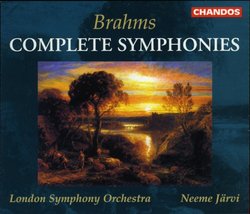| All Artists: Johannes Brahms, Neeme Järvi, London Symphony Orchestra Title: Brahms: Complete Symphonies (Box Set) Members Wishing: 0 Total Copies: 0 Label: Chandos Release Date: 10/19/1999 Album Type: Box set Genre: Classical Style: Symphonies Number of Discs: 4 SwapaCD Credits: 4 UPC: 095115977620 |
Search - Johannes Brahms, Neeme Järvi, London Symphony Orchestra :: Brahms: Complete Symphonies (Box Set)
 | Johannes Brahms, Neeme Järvi, London Symphony Orchestra Brahms: Complete Symphonies (Box Set) Genre: Classical
|
Larger Image |
CD Details |
CD ReviewsVery impressive at its best, in Sym. 1 and 2 Santa Fe Listener | Santa Fe, NM USA | 05/29/2009 (5 out of 5 stars) "Here's a curious thing. In 1988-89 Jarvi's Brahms cycle appeared one disc at a time, each symphony paired with a Schumann symphony. Now Chandos is offering just the Brahms on four discs -- not much of a bargain. Unlike grocery shopping, it's good when listening to a new CD not to read the label before consuming. Jarvi is known to be a direct, even blunt conductor with no special feeling for the classical and Romantic German composers. Does he adhere to type here?
Actually, no. This is sweeping big-band Brahms with the LSO playing at full tilt for expression and impact. Jarvi even throws in the occasional Furtwangler touch, generally an unexpected swell and slow down. Today is Brahms day at my house, and compared with the other two conductors I've been listening to, Gunter Wand and Paavo Berglund, Jarvi could pass for a Furtwangler disciple -- a major surprise. The Gramophone, always pro-Jarvi unless proven otherwise, fussed that only the First Sym. was successful, finding the other three symphonies tepid. The First was taped first, and it's a splendid reading, grand without being garrulous, beautifully phrased and played with impeccable execution. I venture that anyone hearing it without reading the label would never guess who the conductor was. Only a bit of slackness in the opening of the finale betrays that we aren't hearing Giulini or Klemperer. Sym. 2 begins at a real Allegro, which is good if you want to distinguish it from the second movement; many conductors take them bot as Andantes. Jarvi takes a pastoral view of tis work -- maybe that's what struck some critics as tepid -- but unlike, say, Eschenbach, who maunders along monotonously, Jarvi injects energy as needed. the finale could begin in a more hushed, mysterious mood, but Jarvi takes it a tempo before the jubilant explosion to follow. The feeling isn't as viscerally exciting as the first, mono version from Bruno Walter in New York, but the LSO surpasses the NY Phil. for sheer sumptuousness. Sym. 3 passes the first hurdle by giving us completely secure, lush string playing, but Jarvi fudges the tricky opening rhythm by slowing down. No foul, though, since Furtwangler did the same. The main tempo isn't perky by any means, but again there's no fear that the reading is tepid. We find ourselves in Gunter Wand territory, with nice balances and carefully tended phrasing. Happily, Jarvi finds more contrast and expression in the two middle movements than Wand, and his orchestra flies higher. After a placid beginning, the finale offers an impressive explosion, but then Jarvi suppresses the glorious horn and cello line. In all, the Third is not as strong as the First or Second (this is often the case for some reason). Sym. 4 poses a challenge, to draw out its intensity beneath the seemingly academic surface of the first and last movements. Jarvi hears the first movement as elegiac rather than intense and conflicted, a valid view but one that prettifies the music, I think. Only the LSO's wonderful sonority saves us from conventionality. In the middle movements Jarvi is schizophrenic, placid in the Andante but on fire in the Scherzo -- one of the most exciting I've heard in a while. The passacaglia is extremely well voiced, dark and rich, when it announces itself in the finale. Jarvi plays the movement as a grand sweep, with a few unfortunate lapses in tension. Overall, my attention was basically held by the orchestra and chandos's luscious sonics. If you acquire this set as a download (elsewhere than Amazon), I'd recommend the First and Second above the other two symphonies. Yet even then, the whole cycle beats out Sawallisch, Eschenbach, Wand, Berglund, and perhaps the mighty Szell, even though the latter has his own masterful First." |

 Track Listings (4) - Disc #1
Track Listings (4) - Disc #1